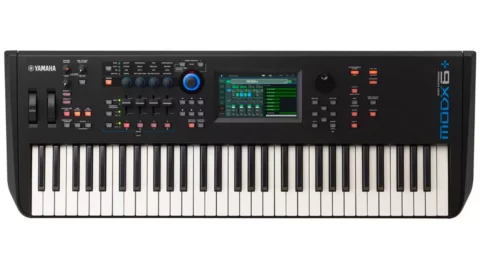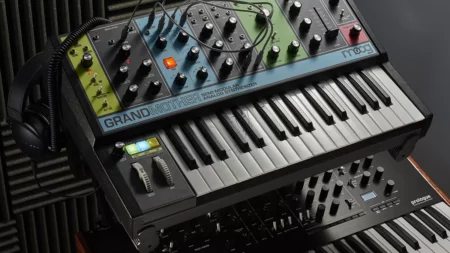Behringer shares Sneak Preview of its Solina String Ensemble
Behringer shared this preview of their upcoming Solina String Ensemble, a Euro format clone of the classic Eminent Solina String Ensemble.
When Behringer first mooted the idea of a Solina String Ensemble clone, it admitted that it didn’t even know if or when it would be built, but more than three years later, it’s here.
Released in 1974 and distributed in the US by ARP Instruments, the original String Ensemble is a 49-note keyboard string ensemble synth incorporated violin, viola, trumpet, horn, cello and contrabass sounds, along with a built-in chorus effect. Organ-style ‘divide-down’ technology gave the impression of polyphony. Its classic sound has been used iconically by Pink Floyd, Tangerine Dream, Joy Division and others.
Behringer’s remake (based on the ‘Revision B’ model) adds a phaser (in the style of the Electro-Harmonix Small Stone from the ‘70s), 5-pin/USB MIDI and external modulation/patching connectivity, all in a compact form factor.
What Behringer says about their version:
“SOLINA faithfully delivers the classic string machine sound that we all know and love.
By staying loyal to its unique circuitry, our Engineers have not only managed to deliver the purest revival of SOLINA, but also by including highly demanded features including a built-in phaser (based on the classic 1970s Small-Stone), External Modulation/Patching connectivity, 5-Pin, and USB MIDI, all whilst in a form factor that works within modern-day setups.
There is truly nothing else on the market today that comes close to the character of this extremely sought-after instrument. We are extremely proud to soon open the experience of SOLINA to you all, once we have the required chips to put it into full-scale production.”
Behringer says that recreating the Solina was quite a challenge, but it’s still managed to keep the price down to an anticipated $359. Unfortunately, their Solina is another one of their ‘hardvaporware’ introductions, because they can’t get the parts to put it into production. Solina will go into production once the required chips have been sourced.
Watch the video and share your thoughts on how accurately captures the originals’ sound!




